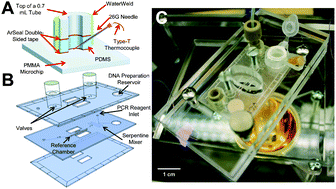From sample to PCR product in under 45 minutes: a polymeric integrated microdevice for clinical and forensic DNA analysis
Abstract
The

* Corresponding authors
a
Department of Chemistry, University of Virginia, 409 McCormick Road, Charlottesville, VA, USA
E-mail:
jpl5e@virginia.edu
Fax: +1 434-243-8852
Tel: +1 434-243-8658
b Center for Microsystems for the Life Sciences, University of Virginia, Charlottesville, VA, USA
c Department of Pathology, University of Virginia Health Science Center, Charlottesville, VA, USA
d ZyGEM Corporation, Innovation Park, Hamilton, New Zealand
e Department of Mechanical Engineering, University of Virginia, Engineer's Way, Charlottesville, VA, USA
The

 Please wait while we load your content...
Something went wrong. Try again?
Please wait while we load your content...
Something went wrong. Try again?
J. A. Lounsbury, A. Karlsson, D. C. Miranian, S. M. Cronk, D. A. Nelson, J. Li, D. M. Haverstick, P. Kinnon, D. J. Saul and J. P. Landers, Lab Chip, 2013, 13, 1384 DOI: 10.1039/C3LC41326H
To request permission to reproduce material from this article, please go to the Copyright Clearance Center request page.
If you are an author contributing to an RSC publication, you do not need to request permission provided correct acknowledgement is given.
If you are the author of this article, you do not need to request permission to reproduce figures and diagrams provided correct acknowledgement is given. If you want to reproduce the whole article in a third-party publication (excluding your thesis/dissertation for which permission is not required) please go to the Copyright Clearance Center request page.
Read more about how to correctly acknowledge RSC content.
 Fetching data from CrossRef.
Fetching data from CrossRef.
This may take some time to load.
Loading related content
